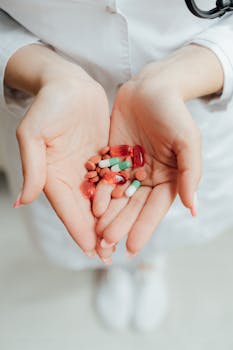Understanding how to effectively manage depression includes exploring a range of treatments, from medications to natural remedies. Supplements for depression are increasingly popular as part of a comprehensive approach to mental health. While these should never replace professional care, they may offer additional support when used thoughtfully.
Supplements for Depression: Exploring Natural Aids
For those interested in alternative treatments for depression, several supplements are available that might provide relief. These supplements aim to support mood regulation and overall mental well-being. However, it’s crucial to approach their use with caution and under guidance from a healthcare provider.
Common Supplements to Consider
There are various supplements commonly associated with mood enhancement and emotional balance. Among the best supplements for depression, several are well-researched:
- Omega-3 Fatty Acids: Found in fish oil, these are believed to support brain health.
- St. John’s Wort: Often associated with combating mild to moderate depression.
- Vitamin B Complex: Particularly B12 and folate, which are vital for mood regulation.
- Magnesium: This mineral is important for neurological health and may alleviate depressive symptoms.
It’s important to remember that while these may provide support, they are not alternative cures for depression.
Considerations When Using Supplements
Before incorporating new supplements, consider potential interactions, especially if you are taking prescribed medications. Supplements can interact with drugs, affecting efficacy and safety. Consulting a healthcare provider is always recommended.
For those seeking alternatives to depression drugs, supplements can be appealing. Nonetheless, they should be part of a broader strategy that may include therapy, lifestyle changes, and medical guidance.
Holistic Approaches: Beyond Supplements
Holistic treatment for depression often involves multiple strategies, including diet, exercise, and therapy. Here, natural remedies for depression can play a role, but they should complement professional treatments.
Alternative Therapies
Beyond supplements, consider these alternative methods to treat depression:
- Exercise: Regular physical activity is known to boost endorphins, enhancing mood.
- Meditation and Mindfulness: These practices can reduce stress and improve mental clarity.
- Cognitive Behavioral Therapy (CBT): An evidence-based therapy effective in altering negative thought patterns.
These alternatives can be powerful when combined, offering a comprehensive strategy for dealing with depression without medication.
Safety and Efficacy
While supplements and alternative treatments offer potential benefits, their effectiveness can vary among individuals. The approach to treating depression naturally should always be personalized, taking into account individual health needs and circumstances.
Exploring such options is valuable, but they should never replace professional medical advice. Supplements for depression may help, but comprehensive care should be the cornerstone of any treatment plan.
Medical Advice and Resources
If you’re considering how to manage depression without medication, consult medical professionals to ensure that any supplements or alternative therapies align with your personal health goals.
For more information on non-prescription alternatives to traditional medication, consider reading our article on over-the-counter Xanax alternatives.
Research and Evidence
Further reading is available on reputable sources like this overview of health practices, which can provide additional context and understanding of how supplements fit into a broader health strategy.
The journey to emotional wellness often includes exploring a variety of tools and treatments. While supplements for depression can play a role in this journey, they are most effective when combined with other holistic and medical strategies.
- Supplements should complement, not replace, professional treatment.
- Consult healthcare providers before starting new supplements.
- Holistic strategies can include exercise, therapy, and mindfulness.
- Natural remedies offer potential support but need professional alignment.
- Research thoroughly and seek credible resources for guidance.
FAQs
Can supplements for depression replace medication?
No, supplements should complement medical treatment, not replace it. Always consult healthcare professionals before making changes to your treatment plan.
What are the benefits of using omega-3s for depression?
Omega-3 fatty acids support brain health and may reduce symptoms of depression when taken as part of a balanced diet.
Are there side effects when taking St. John’s Wort?
Yes, St. John’s Wort can interact with certain medications and may cause side effects. Consult a healthcare provider before use.
How effective is exercise as an alternative therapy for depression?
Exercise is highly effective in boosting mood and reducing depressive symptoms and is an integral part of holistic approaches to mental health.
Is it safe to combine multiple supplements for treating depression?
Combining supplements should be done with caution. Consulting a healthcare professional is essential to avoid interactions and ensure safety.






